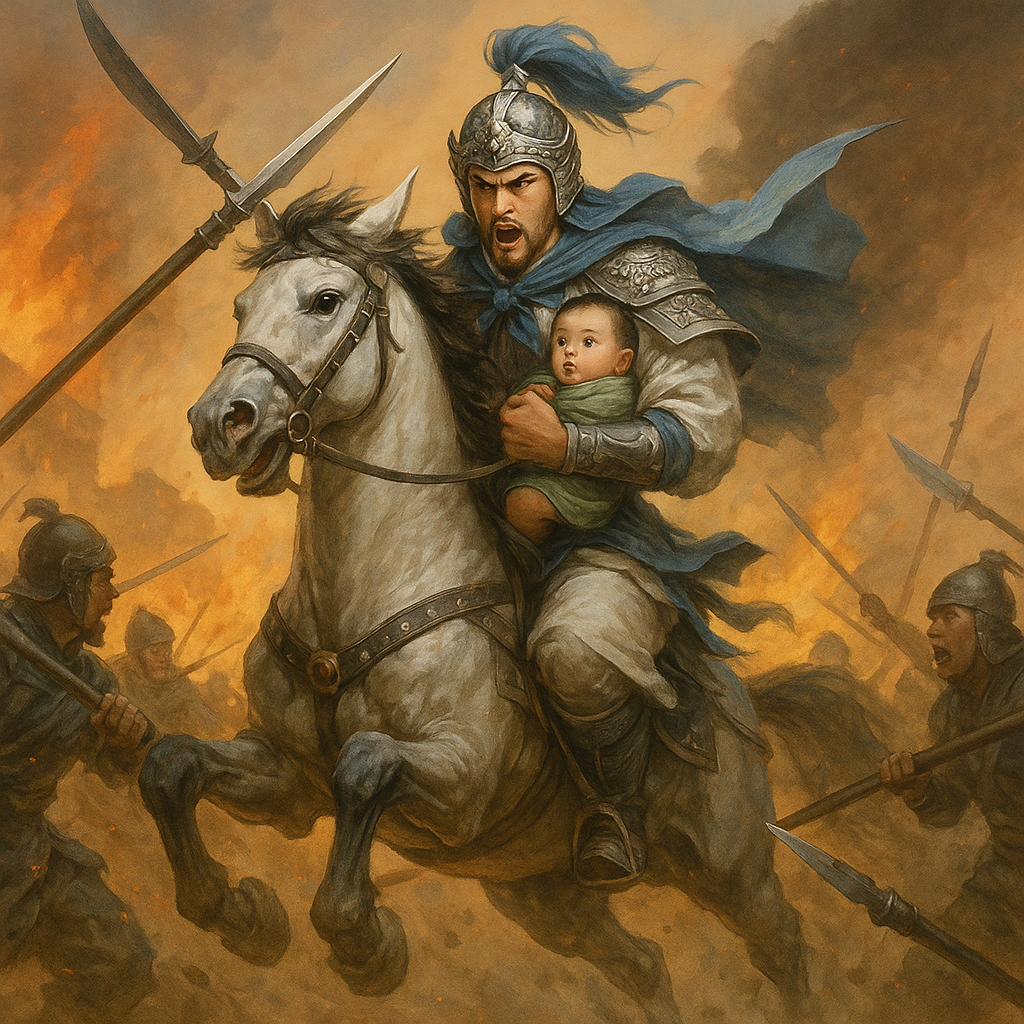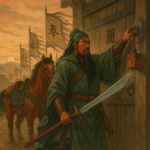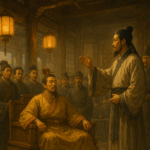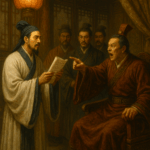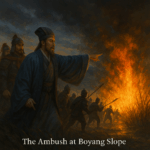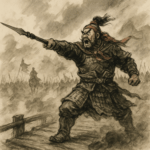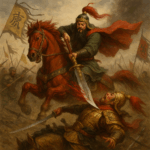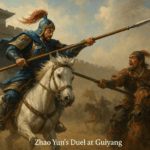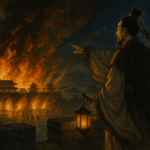Zhang Fei, having seen Guan Yu let Cao Ren’s survivors slip downstream, led his men along the lower reaches and fell upon Cao Ren’s weary troops, slaying many. Suddenly he encountered Xu Chu; they clashed fiercely until Xu Chu, wary of Zhang Fei’s fury, broke off and fled. Zhang Fei pressed on, rejoining Liu Bei and Zhuge Liang, and rode upriver to the upper crossing. There Liu Feng and Mi Fang had already arranged boats; at Zhang Fei’s signal they ferried everyone across and headed straight for Fan, whereupon Zhuge Liang ordered the rafts to be set alight and destroyed.
Meanwhile, Cao Ren regrouped his battered force at Xinye and sent his cousin Cao Hong to report their defeat to Cao Cao. Enraged, the Chancellor roused half a million men, sealing the hills and valleys around Xinye. He dispatched scouts to scour the mountains and dam the White River. Dividing his army into eight columns, he prepared to march on Fan. His adviser Liu Ye counseled, “When first you reached Xiangyang, you won the hearts of the people. Now Liu Bei has moved all Xinye’s inhabitants to Fan. If you storm the city, those counties will be ground to powder. Better to send an envoy to invite Liu Bei to surrender: if he refuses, you show your kindness; if he comes in submission, you win Jingzhou without striking a blow.” Cao Cao consented and asked, “Who shall go?” Liu Ye replied, “Xu Shu served Liu Bei faithfully and is in our camp—let him be our envoy.” Cao Cao hesitated, “What if he never returns?” Liu Ye insisted, “If he refuses, it will be a disgrace. You must trust him.” So Cao Cao summoned Xu Shu and said, “I meant to trample Fan underfoot, but pity for the people holds me back. Go to Liu Bei and tell him: if he surrenders, his life will be spared and he will be ennobled; if he persists, we will slay army and civilian alike, burning city and grain alike. I send you because I trust your loyalty—do not fail me.”
Xu Shu set out at once. When he arrived at Fan, Liu Bei and Zhuge Liang received him warmly, recalling old ties. Xu Shu reported, “Cao Cao sends me ostensibly to win your submission, but in fact he plans to divert his eight columns, dam the river, and storm these walls. Fan cannot long hold—you should make your plans to withdraw.” Liu Bei urged him to stay, but Xu Shu declined: “I would be mocked should I not return. My widowed mother waits at home—my conscience will not allow me to scheme here. You have the Sleeping Dragon to guide you; the great enterprise will succeed without me.” Reluctantly, Liu Bei let him go.
When Xu Shu returned to Cao Cao, he told him that Liu Bei had no thought of surrender. Cao Cao, seeing his chance, immediately advanced. Liu Bei asked Zhuge Liang for advice. The Master said, “We should abandon Fan and fall back on Xiangyang.” Liu Bei protested, “The people have followed me so far—how can I leave them?” Zhuge Liang replied, “Announce that all who wish to follow may cross; those who choose to stay shall remain.” He dispatched Guan Yu to marshal the boats, and ordered Sun Qian and Jian Yong to proclaim in the city, “The enemy comes; this lonely stronghold will not hold. All who wish to follow may cross at once.” At these words the two counties’ people cried, “Even in death we follow!” That same day, with tears and wailing, they ferried the old and young across. Watching from his boat, Liu Bei wept, “Because of me, these people suffer such hardship—what right have I to live?” He tried to throw himself into the river but was restrained by his aides. The refugees reached the far bank; many who could not cross wept as they looked back. Liu Bei ordered Guan Yu to send more boats, and at last he mounted his horse and rode on.
They rode on until they reached the East Gate of Xiangyang. The walls flew banners and the moat bristled with sharpened stakes. Liu Bei reined in his horse and cried, “My nephew Liu Cong! I come only to shelter the people—open the gates!” Terrified, Liu Cong would not appear. Cai Mao and Zhang Yun rode to the enemy towers and ordered arrows showered down. Outside, the refugees wept together. Then a general strode out with a few hundred men, proclaiming, “Cai Mao and Zhang Yun are traitors! Lord Liu is a benevolent ruler who comes to rescue his people—why bar him?” Tall and stout-faced, he was Wei Yan of Yiyang. He slew the gate guards with his hooked sword, opened the gate and lowered the drawbridge, shouting, “My lord invites you, Liu Bei—let us slay these traitors!” Zhang Fei spurred his horse toward the breach, but Liu Bei checked him: “Spare the people!” Wei Yan admitted Liu Bei’s troops, holding the gate wide.
Immediately another officer rode out with his force, roaring, “Wei Yan, you upstart! Do you dare rebel?” He was Wen Ping. At once the two clashed in fierce combat; their battle cries shattered the quiet of the city walls. Liu Bei lamented, “I sought only to shelter the people—now I bring them harm. I do not wish to enter Xiangyang!” Zhuge Liang urged, “Jiangling lies to the south and is the key to Jingzhou. Better to seize it as our base.” Liu Bei agreed, drew aside from the main road, and led the refugees toward Jiangling. Many citizens of Xiangyang, seizing the chance, fled in confusion and joined him. Behind him, Wei Yan and Wen Ping fought desperately until their troops were exhausted; at last Wei Yan galloped away and vanished.
Thus, with civilians numbering over a hundred thousand and thousands of supply carts, Liu Bei passed by his brother Liu Biao’s tomb. He and his generals knelt at the grave, weeping, “My humbled virtue and meager talent have failed to repay my brother’s trust. My sins are mine alone, not the people’s. I beg your spirit to watch over the people of Jing and Xiang.” As they mourned, scouts returned: “Cao Cao’s host is camped at Fan, and he will cross the river at once.” The officers whispered, “Jiangling is defensible; we cannot hope to march thirty miles before Cao Cao arrives. Better to abandon the people and save our own skins.” Liu Bei wept, “He who gathers the people must consider them above all. How can I abandon these people who follow me?” Moved, the refugees wept again.
Zhuge Liang said, “The enemy will overtake us soon. Send Guan Yu to Jiangxia to summon aid from Liu Qi. Have him bring boats to meet us at Jiangling.” Liu Bei agreed, and dispatched Guan Yu with Sun Qian and five hundred men to Jiangxia. He put Zhang Fei in charge of the rear guard, Zhao Yun to protect the old and infirm, and tasked the rest with guiding the people—each day they would press on no more than ten miles.
Meanwhile in Fan, Cao Cao crossed the river to Xiangyang and summoned Liu Cong. Terrified, Liu Cong dared not go; Cai Mao and Zhang Yun urged him on. Wang Wei, a loyalist, warned him in secret, “Liu Bei has fled and surrendered Jingzhou—Cao Cao will be unprepared. You could muster a handful of troops in this narrow gorge and strike him down, then proclaim your valor. The empire would quake at such news.” Cai Mao had him seized and threatened; Wang Wei was slain.
Cai Mao and Zhang Yun then kissed the Chancellor’s hand. They flattered him, telling of Xiangzhou’s resources: twenty-eight divisions of troops and vast grain stored in Jiangling. Cao Cao appointed Cai Mao “Marquis Who Pacifies the South” and Grand Admiral of the Navy, Zhang Yun as his deputy; Liu Cong was made Inspector of Qingzhou and ordered to travel there. Liu Cong protested his inability, but Cao Cao insisted—Qingzhou lay near the court and would keep him safe. Cai Mao, Zhang Yun, and Liu Cong left Xiangyang; only the former general Wang Wei accompanied them as far as the river; the rest returned home. Cao Cao ordered Yu Jin to pursue and kill mother and son. Yu Jin led cavalry to overtake them: Cai Fu ren’s wife and young lord were slain, and Yu Jin returned with their heads. The Chancellor rewarded him.
Seeking Zhuge Liang, Cao Cao sent men to scour the Three Gorges—but Zhuge Liang had long ago secreted his family deep within the river valleys. Furious, Cao Cao vowed revenge.
Xiangyang secured, Xun You advised, “Jiangling is the key to Jingzhou’s grain and gate to the region—if Liu Bei holds it, we cannot shake him.” Cao Cao nodded, then selected an officer to lead a vanguard out of Xiangyang—only Wen Ping failed to appear. When questioned, Wen Ping wept: “How can I face you when I failed in my duty to protect my lord’s lands?” Moved, Cao Cao appointed him Governor of Jiangling and enfeoffed him Marquis of Fan, then ordered him to take his army and clear the way south.
Back on the eastern road, Liu Bei marched with tens of thousands of refugees and over three thousand troops, Zhang Fei in the rear, Zhao Yun protecting the family. Zhuge Liang fretted, “Guan Yu has gone to Jiangxia—what if he does not return?” Liu Bei said, “Let me go myself to fetch him.” The Master replied, “No—send me.” Liu Bei granted his request. That evening, a wild wind swept up, blotting out the sun with dust. Jian Yong, versed in omens, read a warning: “Tonight portends great disaster. We must abandon the people and flee.” Liu Bei refused: “How can I forsake them now?” Jian Yong urged, “If you cling to them, misfortune follows.” Liu Bei asked, “Where are we?” He was told, “We near Dangyang County, at Mount Jing.” He ordered a camp set on that hill.
As dusk turned to midnight, the wind howled and distant cries rang out. Alarmed, Liu Bei gathered two thousand of his best troops to meet the attack. The enemy rushed in like a flood—and Liu Bei fought desperately. Just as all seemed lost, Zhang Fei burst through with reinforcements, carving a path of blood through the enemy and rescuing Liu Bei. But Wen Ping intercepted them; Liu Bei cursed, “Traitor! How dare you face me?” Wen Ping, ashamed, withdrew. Zhang Fei shielded Liu Bei, fighting and retreating until dawn. When he paused, only a hundred horsemen remained. The refugees and generals—Mi Zhu, Mi Fang, Jian Yong, Zhao Yun among them—had vanished. Liu Bei cried, “These hundreds of thousands of souls followed me only to face disaster; my generals and family are lost—what grief!”
Just then Mi Fang staggered into the camp, wounded by arrows, crying, “Zhao Yun has defected to Cao Cao!” Zhang Fei roared, “He is a sworn brother—how could he betray us?” Liu Bei said, “Zhao Yun would never forsake us for profit.” Mi Fang insisted, “I saw him ride north.” Zhang Fei, enraged, gathered twenty horsemen and rode to Changban Bridge, vowing to kill Zhao Yun on sight. He had his men cut branches, lash them to their horses’ tails, and kick up dust as a feint. He himself stood on the bridge, spear in hand, scanning the road.
Meanwhile Zhao Yun, having clashed with Cao Cao’s forces since midnight, slew his way through until dawn but found neither Liu Bei nor the refugees. He thought, “I must find Master’s mother and the young lord—my honor demands it. If I fail, I shall die by my spear.” Only thirty men remained with him. He charged through the chaos of fleeing peasants, inquiring at every encampment. Suddenly he spotted Jian Yong lying wounded in the grass. He dismounted, embraced him, and asked, “Where are my lady and young master?” Jian Yong replied, “Lady Gan fled with a crowd of refugees to the south. I tried to follow but was struck down and lost my horse.” Zhao Yun lent him his own horse and urged him to return to Liu Bei with news: “I will find them or die in the attempt!” Jian Yong departed, and Zhao Yun spurred on.
Soon he saw a company of refugees huddled together. He called, “Is Lady Gan among you?” They pointed ahead, and from the wreckage of a burned mud wall he found her, barefoot, clutching young Liu Shan. She wept, “The mother is ruined but the child lives—save him. I die content.” Zhao Yun, tears in his eyes, lifted the boy to his saddle, but Lady Gan refused to leave her friend Mi Zhu, wounded and abandoned. She insisted, “Without me, the boy cannot be raised. I will slow you—leave me here.” But the enemy closed in. Zhao Yun ordered her to climb aboard, but she still refused, and in despair flung herself into a dry well. He covered her body with earth and hurried on, sword at his side and the boy in his arms.
At that moment he met Chunyu Dao of Cao Ren’s command. Drawn into combat, Zhao Yun slew him with one thrust, took his horse, and continued. Next he encountered Yan Ming and his soldiers; easily he overcame them, then charged into another block commanded by Zhang He. After a brief duel, Zhang He pursued him, but Zhao Yun’s horse leapt from a hidden pit—Zhang He, astonished, pulled back.
As Zhao Yun fled, four more enemy officers—Ma Yan and Zhang Yi behind, Jiao Chu and Zhang Nan ahead—blocked his path. He fought them off with his famed Green Dragon Crescent Blade, cutting through armor like paper. The enemy ranks broke, and he burst free once more.
That day Cao Cao stood atop Mount Jing, watching a lone warrior whose valor was irresistible. He asked, “Who is that?” Cao Hong rode down and called, “Tell us your name!” The warrior answered, “I am Zhao Zilong of Changshan.” Cao Cao declared, “A true tiger general—take him alive!” Thus Zhao Yun escaped the trap.
By nightfall his ride had taken him and the boy far from the disaster. This single battle—holding Lord Liu’s infant son, he broke through four encirclements, slew fifty of the enemy’s finest, and preserved his master’s heir—sealed his legend. As a later poem exclaimed:
“Blood soaks the warrior’s crimson coat;
Who else at Changban could match his might?
Charging through fire and spear alike,
Only Zhao of Changshan bears such fame.”
Yet even now he had not reached safety. From the hillside two more officers barred his path—Xiahou Dun’s brothers Zhong Jin and Zhong Shen, wielding axe and halberd, cried, “Zhao Yun, surrender!”
But how did the single horseman escape once more? That tale waits until the next chapter.
